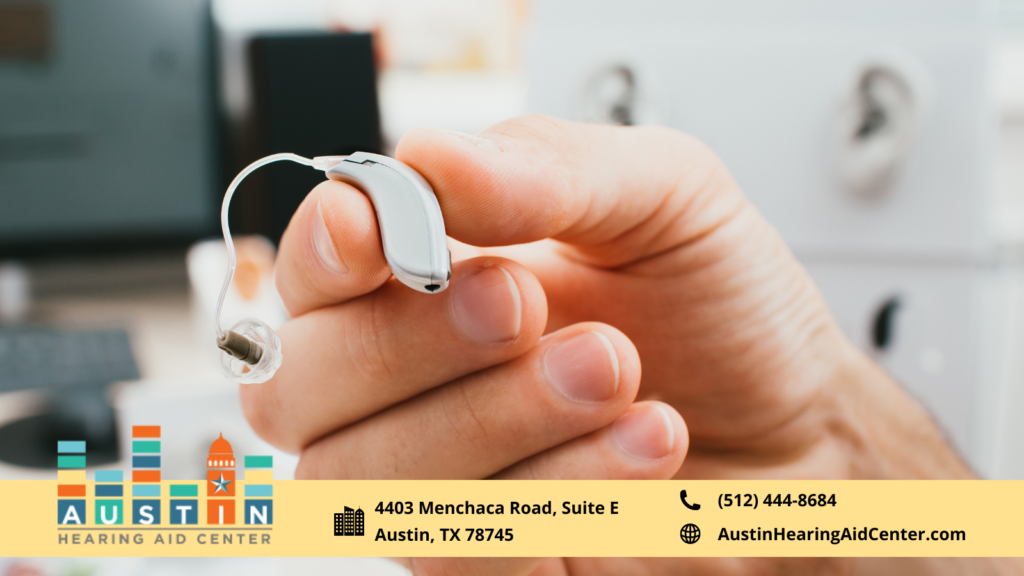Choosing the right hearing aid takes some time to educate yourself on the options available to find what is best for you and your lifestyle. It will depend on several factors, starting with the level of hearing loss, budget, and hearing needs. Acquiring hearing instruments is not as easy as shopping for a perfect pair of shoes. Start by consulting with an audiologist. Review your hearing test results and hearing healthcare needs to determine the best options for you.
Types of Hearing Aids
There are various hearing aid styles on the market. Being familiar with the different types of hearing aids will make it easier for you to choose the best hearing aid that suits your preferences.
- Behind-the-ear (BTE) hearing aids: BTE hearing aids fit over the back of your ear and are connected to a custom-fit earmold that fits in your ear, similar to an earbud. This type of hearing aid may be recommended for a wide range of hearing loss and can often hold more features and technology than its smaller counterparts.
- In-the-ear (ITE) hearing aids: ITE hearing aids are custom-fit and sit in the outer part of the ear. This type of hearing aid style is suitable for mild to severe hearing loss.
- In-the-canal (ITC) hearing aids: ITC hearing aids are smaller and sit deeper in the ear canal. They are less visible than ITE hearing aids.
- Completely-in-canal (CIC) hearing aids: These are the smallest type of custom-fit hearing aid and are worn completely inside the ear canal. They are recommended for individuals who want discretion when it comes to hearing instruments.
- Receiver-in-canal (RIC) hearing aids: RIC hearing aids fit over the back of your ear, offer a high level of comfort, and are suitable for people with mild to severe hearing loss.
- Extended-wear hearing devices: Lyric Hearing is the most discreet hearing technology option currently on the market and is placed in the ear canal(s) by an audiologist. Similar to contact lenses, these devices are purchased on a yearly subscription basis and are worn 24/7 for several months at a time. For those who are a candidate for Lyric and are open to wearing something 24/7, they are a good option for people with active lifestyles.
Factors to consider when choosing a hearing aid
Hearing aids are an investment. Taking the time to consult with an audiologist, have a comprehensive evaluation, and review your treatment options are important first steps. Educating yourself on the options will help you decide what is best for you and your lifestyle and help you stay connected.
Below are some factors you should consider when choosing a hearing aid:
- Type and degree of hearing loss: This will help determine the ideal type of hearing aid and technology level that best addresses your specific hearing requirements.
- Budget: The more advanced the hearing aid is, and the more features it offers, the higher the price of the technology. If you’re on a budget, you may start with a good-quality hearing aid with basic features. You can level up or accessorize later along your hearing journey.
- Lifestyle, hearing needs, and ease of use: Your daily activities and the environments you are regularly in will be a big help in determining the best hearing aid for you. It’s also a good idea to consider the ease of use of hearing aids and how using the device can fit into your daily routine.
- Physical comfort and fit: Since you will be wearing hearing aids most of the time, it is important that you like how your hearing aids fit. There are various hearing aid styles available for you to choose from; pick the style that you are most comfortable and happy with. The sound must be comfortable, although keep in mind that initially, sounds that you have not been hearing well for some time may all seem equally loud. As your brain adjusts to hearing the birds again and other sounds you have been missing, there will be more balance in the level of the sounds and speech in your environment.
- Brand reputation and support: When it comes to hearing aids, quality and brand reputation should be non-negotiable. There are numerous over-the-counter devices out there claiming to be the “best.” Do your homework when it comes to seeing low price points advertised. It is likely that many of these devices are not hearing aids and instead are amplifiers advertised as medical devices. Use caution when researching the options available so that you get the service and hearing devices you need and do not waste your time and money. Audiologists will help educate on the options available and choose a hearing techonology from a reputable brand with a good track record for customer support.
- Personal preferences: What features do you need from a hearing aid? Hearing aids have a range of features and technology, such as Bluetooth connectivity, telecoil, direct streaming, remote control, etc. You might want to list the important features to you so it will be easier to narrow down your choices.
Your audiologist will be happy to walk you through the hearing aid selection process. Audiologists can provide choices that best suit your hearing requirements, budget, lifestyle, and other hearing needs.
Once you have selected a hearing aid, your audiologist will program the devices to ensure you get the best hearing improvement possible.
Hearing Aids in Austin, TX
Austin Hearing Aid Center is an authorized provider of quality hearing aids in Austin, TX.
Contact us today to schedule an appointment!



